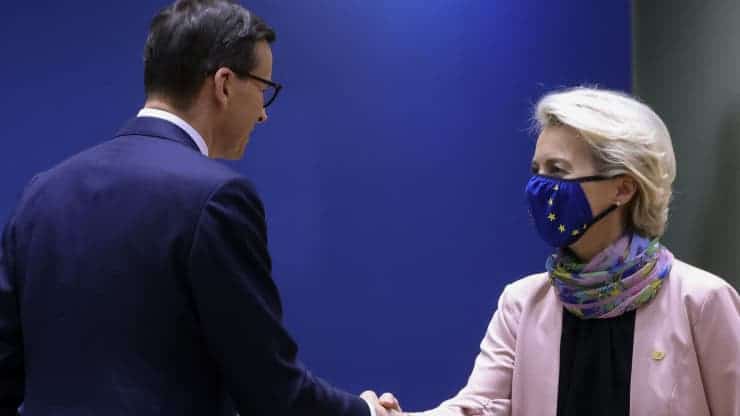
BRUSSELS, Belgium — The ongoing showdown between Poland and the European Union is set to dominate a Brussels summit this week.
EU leaders arriving in the Belgian capital on Thursday could not escape questions on the tense relationship between Warsaw and Brussels, and the subject was actually added to the agenda at the last minute.
“We are very concerned,” Irish Prime Minister Micheal Martin said Thursday on the escalating spat with Poland.
The eastern European nation and the European Commission, the executive arm of the EU, have clashed for several years over the implementation of the rule of law, but their differences intensified earlier this month after the highest court in Poland said that parts of EU law were in conflict with the Polish constitution.
The decision ultimately challenges the supremacy of European law and the very foundations of the political and economic group.
Hungary’s Prime Minister Viktor Orban, often at odds with Brussels himself, said he agrees with the ruling. “What is going on here is, regularly, European institutions circumvent the rights of the national parliaments and governments,” Orban said Thursday.
“Poland? Best country in Europe — there is no need to have any sanction, it is ridiculous,” Orban also said about potential action that Brussels might take against Warsaw.
The European Union was built on the principle that member states follow a common rulebook, even though they retain the final say in some policy areas. This means, for example, that an EU country is free to decide its own fiscal policy, but it’s supposed to have a public debt and deficit in line with EU rules.
Earlier this week, Polish Prime Minister Mateusz Morawiecki and European Commission President Ursula von der Leyen engaged in a heated discussion on the matter. Morawiecki said his country would not be intimidated and the highest law in Poland was its constitution. On the other hand, von der Leyen said her team could take action.
“We cannot and we will not allow our common values to be put at risk. The Commission will act,” she said in Strasbourg, France.
Energy crisis
This all comes at a time when Europe is grappling with higher energy costs — a problem that, in the short term, could derail economic recovery and, in the long term, affect its climate ambitions.
At his arrival in Brussels, Orban also challenged the EU’s climate targets. “What Timmermans [Europe’s climate chief] and others proposed will kill the middle class of Europe,” he said.
The commission and some EU nations believe they need to accelerate the transition to a climate-neutral economy and invest more on renewables. But for Hungary, and notably Poland, they see a quick transition as a risk to their economies given the role that coal still plays in those countries.
Merkel’s last summit
Against this backdrop, German Chancellor Angela Merkel is preparing to say goodbye to European politics.
After 16 years in power, she is due to be replaced by Olaf Scholz, a socialist party member who has served as the country’s finance minister. Thursday and Friday’s summit in Brussels will be Merkel’s 107th gathering of this kind.
When asked if he was going to miss the presence of Merkel, Croatian Prime Minister Andrej Plenković said: “Absolutely.” He told CNBC that Merkel was not just the German leader, but also a European and global leader.
Greek Prime Minister Kyriakos Mitsotakis told CNBC that Merkel is by nature a consensus builder and recognized how she played a key role in keeping Greece in the euro zone at the height of the sovereign debt crisis.





























